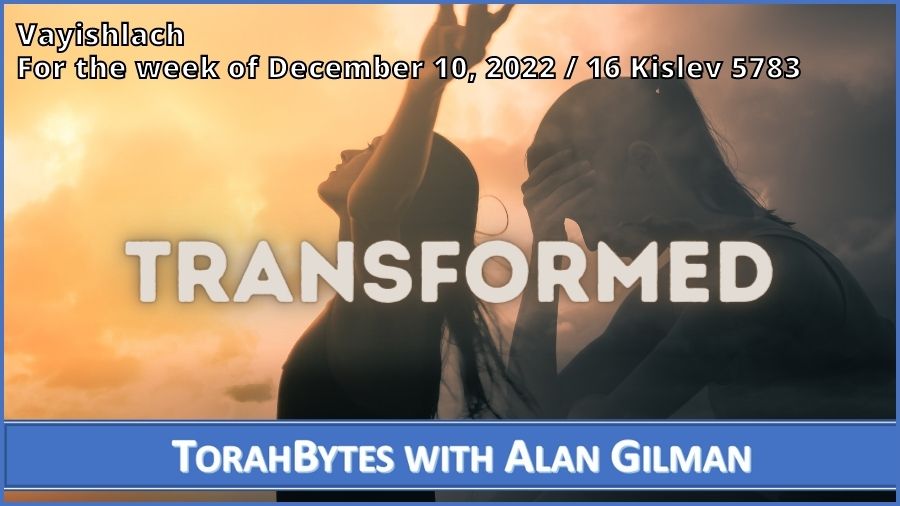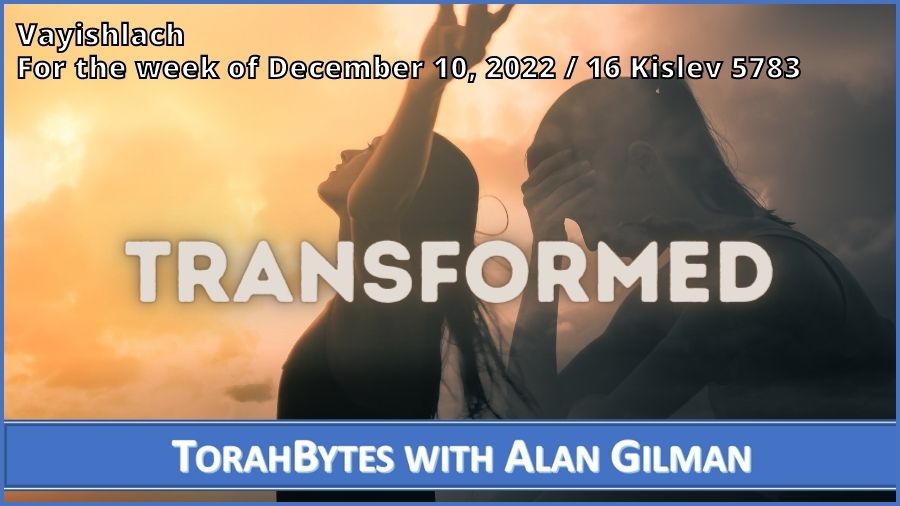Your cart is currently empty!

Transformed

Transformed
For the week of December 10, 2022 / 16 Kislev 5783

Vayishlach
Torah: Bereshit/Genesis 32:4 – 36:43 (English: 32:3 – 36:43)
Haftarah: Hosea 11:7 – 12:12
Download Audio [Right click link to download]
And Jacob lifted up his eyes and looked, and behold, Esau was coming, and four hundred men with him. So he divided the children among Leah and Rachel and the two female servants. And he put the servants with their children in front, then Leah with her children, and Rachel and Joseph last of all. He himself went on before them, bowing himself to the ground seven times, until he came near to his brother. (Bereshit/Genesis 33:1-3)
Jacob was terrified of his brother Esau. And not for no reason. About twenty years before, instigated by their mother, Jacob tricked their father Isaac into giving the blessing of the firstborn to him instead of his older twin. By customary rights, Esau should have been the one to carry forth the bulk of the inheritance, which in this case, would have included the promises of God first given to their grandfather Abraham.
Some people might get hung up by the fact that God had already foretold that Jacob would take the primary place in the family (see Bereshit/Genesis 25:23). But God’s plans for the two boys in no way justifies the underhanded method employed by Jacob and Rebekah. We also may think it strange that something of such importance not only would be handled this way, but couldn’t Isaac simply have nullified the stolen blessing? Perhaps, but he didn’t. Whether we can appreciate the cultural values of their day or not, what happened happened. And what happened understandably infuriated Esau to the extent that he vowed to kill his brother.
Again, at his mother’s urging, Jacob did what many of us would have done in similar circumstances; he ran away. Perhaps if he would have given thought to the meaning of the blessing, he may have risked staying, trusting that God would work it out. The problem is he didn’t believe in God yet. This is clear by his response to God’s words to him in Bethel on his way to Mesopotamia. Notice the “if”: “If God will be with me and will keep me in this way that I go, and will give me bread to eat and clothing to wear, so that I come again to my father’s house in peace, then the LORD shall be my God” (Bereshit/Genesis 28:20-21). Not only didn’t Jacob yet have a personal relationship with the God of his father and grandfather, he also hadn’t fully grasped the fulness of the blessing he stole.
Jacob went off to Haran in Mesopotamia with some sense that he would one day return to the land of his birth. However, it isn’t clear whether he would have, or if he only did so due to how unmanageable the situation with his uncle Laban had become. Be that as it may, as he struggled with this, God spoke to him again, telling him to return home (see Bereshit/Genesis 31:13). Without the insight of Scripture, we might assume that he was spiritualizing his leaving yet another difficult situation. But this indeed was God’s direction. To Jacob’s credit, he did it despite what lay ahead.
As he headed back home, he faced his greatest fear, Esau, but did so in his usual manner of trying to manipulate the situation in order to try to appease his brother. He even put his own family at risk so as to better protect himself.
Then, it was time. Jacob had struggled with others his whole life. Now he was to undergo a struggle like none other as God wrestles with him all night. True to form Jacob doesn’t give up, a tenacity that God commends. Jacob as a result is given a new name to redefine his life along with a limp to remind him of that night. He emerges transformed. Hours earlier he was overwhelmed by fear, doing what he always had done, as he attempted to manipulate the situation to his advantage. Now, he was different as he went to meet his brother, limping as he did so, and discovered that his brother’s anger had abated.
I imagine he may have discovered his brother’s changed attitude regardless. However, we don’t know how Jacob’s anxiety may have irritated the situation. What we do know is that he was a completely changed man able to move forward in what God had for him without the controlling fear.
I don’t know how God wants to work such dramatic change in you and me, but, as followers of the Messiah, he will. A key New Covenant promise is that he would put his Torah in the hearts of his people (see Jeremiah 31:33). Core to the working of the Messiah in our lives is his transformative work of placing God’s ways, perspective, and desires into the center of our beings. He may or may not do so through a dramatic encounter such as what Jacob experienced that night but do it he will.
Scriptures taken from the English Standard Version